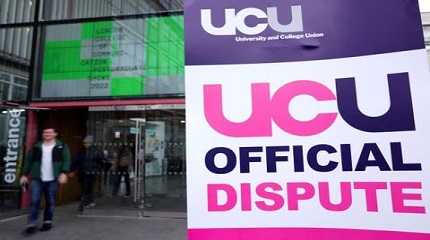
LONDON, July 27 (Reuters) - When 22-year-old American student Amelia Dias completed her final year of studying international relations and law at the University of Edinburgh this summer, she was handed an apology letter instead of a degree certificate.
The letter told Dias that, as Edinburgh was among the more than 100 British universities hit by a staff boycott of marking and assessment this year, the assignments she had completed had not all been graded, and it could not award her a degree.
Without that degree, for which she paid around 80,000 pounds ($102,792) in tuition fees, she cannot apply for the graduate visa she needs to stay in the country, throwing into doubt the job in sales she had been due to start in London next month.
Dias is one of tens of thousands of students across Britain who have been impacted by the months-long assessment boycott by staff in a dispute over pay and working conditions which has seen classes, exams and now graduations disrupted.
Left in limbo, with little clarity on when the situation may be resolved, many cannot take up job offers or progress to postgraduate study, and international students whose visas are coming to an end face having to return home.
Dias, from Florida, told Reuters her immigration position was becoming more precarious. She could extend her existing visa until January, for a fee, but does not yet know whether that will be enough for her prospective employer.
"I did what was necessary to obtain my degree. I wrote my dissertation within the deadline period, I never turned in a late assignment," she added. "I had given a lot to this university ... I never thought that it would get to this."
A spokesperson for Britain's Home Office said international students without results can request a letter of confirmation from their sponsor or return to their home country and apply for another student visa.
But fellow American Anna Hendricks, who was due to start a postgraduate law course in the UK in September, said her future institution had not accepted a letter from the University of Edinburgh because it lacked details.
"It's likely that as it stands, I will have to leave the country by Sept. 30," she said.
The University of Edinburgh said 27% of final year students had not received their degree at the time of graduation.
"We regret that we have not been able to shield our students from the impact of this national dispute, and we are deeply sorry about the continued uncertainty that some of them face over their immediate futures," it said in a statement.
SIX-MONTH BOYCOTT
Hundreds of thousands of workers in Britain in sectors from healthcare to transport have taken strike action over the last year as pay awards failed to keep pace with inflation that hit a 41-year high of 11.1% in October. Inflation in June was 7.9%.
The Universities and Colleges Employers Association, which negotiates pay on behalf of 144 higher education institutions, offered a 5-8% rise. That was partially implemented in February, with the rest due in August.
But the University and College Union (UCU), which represents more than 120,000 staff, is still staging a boycott from April to the end of September over what it says is a 25% pay cut since 2009.
With its members refusing to grade students' work in the key assessment period for universities, the institutions for which they work cannot award some degrees.
Edinburgh has estimated that if the boycott ends as planned, students are likely to be told the outcome of their degrees in November, although some could receive their marks earlier.
The National Union of Students supports the UCU's demands, and many students have worn UCU sashes or carried banners to graduation ceremonies that have gone ahead despite the lack of a certificate.
Scottish student Ailsa Watt, who wore a 'pay your staff' sash, blamed the University of Edinburgh for not finding a solution. Watt, who studied Spanish and Chinese, faces not being able to take up a teaching job in Shanghai without her degree certificate.
"The University of Edinburgh has made me regret coming to university at all," she said.
More than 140 universities have been impacted, including some of the most internationally renowned. Last month the University of Cambridge said more than half of the approximately 4,500 undergraduate students who were due to graduate would be affected.
'WE'RE PAYING THEM SO MUCH'
University students in Britain pay a tuition fee, which for most domestic students has been capped at 9,250 pounds a year since 2017. The Scottish government pays the fees of Scottish students attending Scottish universities.
International students pay much more, providing a vital source of income. According to the British Council, international undergraduate tuition fees average around 22,200 pounds per year and can be as high as 38,000 pounds a year.
The longer the dispute drags on, the higher the potential risk to the international reputation of Britain's universities - three of which are in the top ten in the world, according to the Times Higher Education 2023 rankings.
The government has largely stayed silent, with education minister Gillian Keegan this month saying the dispute was between universities and their lecturers, although she urged a resolution.
There were nearly 680,000 international students studying in the UK in 2021-22, data from the Higher Education Statistics Agency shows, with the year to September 2022 seeing the highest annual number of study visas granted on record.
Research published by Universities UK International in May found the 2021/22 intake of international students contributed 41.9 billion pounds to the UK economy.
"Every year, universities in the UK are depending more and more on the finances of international students," said Hendricks. "We're paying them so much, we want to know where our money's going."
($1 = 0.7783 pounds)




